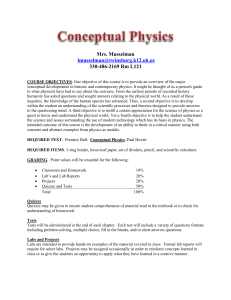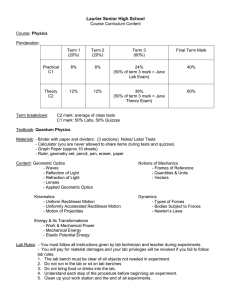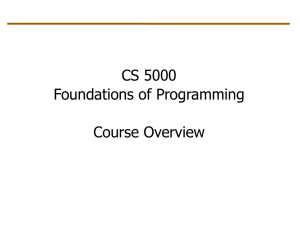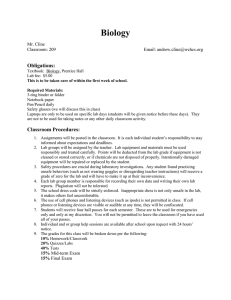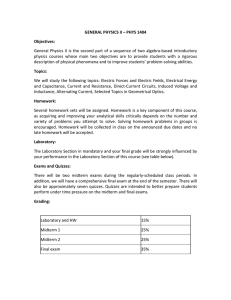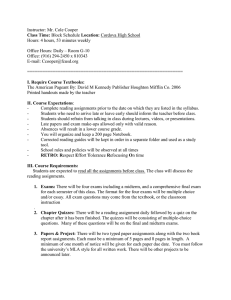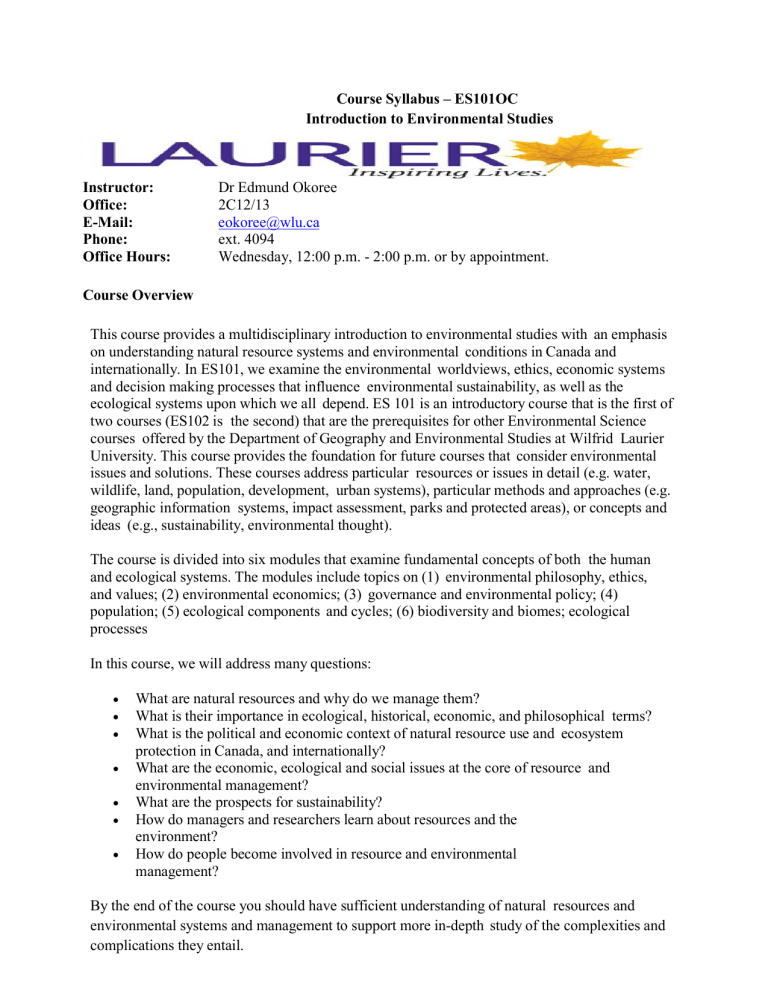
Course Syllabus – ES101OC Introduction to Environmental Studies Instructor: Office: E-Mail: Phone: Office Hours: Dr Edmund Okoree 2C12/13 eokoree@wlu.ca ext. 4094 Wednesday, 12:00 p.m. - 2:00 p.m. or by appointment. Course Overview This course provides a multidisciplinary introduction to environmental studies with an emphasis on understanding natural resource systems and environmental conditions in Canada and internationally. In ES101, we examine the environmental worldviews, ethics, economic systems and decision making processes that influence environmental sustainability, as well as the ecological systems upon which we all depend. ES 101 is an introductory course that is the first of two courses (ES102 is the second) that are the prerequisites for other Environmental Science courses offered by the Department of Geography and Environmental Studies at Wilfrid Laurier University. This course provides the foundation for future courses that consider environmental issues and solutions. These courses address particular resources or issues in detail (e.g. water, wildlife, land, population, development, urban systems), particular methods and approaches (e.g. geographic information systems, impact assessment, parks and protected areas), or concepts and ideas (e.g., sustainability, environmental thought). The course is divided into six modules that examine fundamental concepts of both the human and ecological systems. The modules include topics on (1) environmental philosophy, ethics, and values; (2) environmental economics; (3) governance and environmental policy; (4) population; (5) ecological components and cycles; (6) biodiversity and biomes; ecological processes In this course, we will address many questions: • • • • • • • What are natural resources and why do we manage them? What is their importance in ecological, historical, economic, and philosophical terms? What is the political and economic context of natural resource use and ecosystem protection in Canada, and internationally? What are the economic, ecological and social issues at the core of resource and environmental management? What are the prospects for sustainability? How do managers and researchers learn about resources and the environment? How do people become involved in resource and environmental management? By the end of the course you should have sufficient understanding of natural resources and environmental systems and management to support more in-depth study of the complexities and complications they entail. Learning Objectives • • • Explain and describe the basic principles of environmental science including general scientific laws, energy and nutrient cycles, ecosystem processes and the relationship to the human system including topics on governance, economics, sociology and sustainability. Identify the general history of environmental awareness and worldviews Interpret and produce short reports from environmental data, background articles and group role playing. Required Text Miller, G.T, D. Hackett and C. E. Wolfe. (2017). Living in the Environment (4th Canadian Edition). Nelson Education Ltd. The bookstore is offering a digital version of the textbook. The course text is a relatively new offering among ES textbooks and its strength is the significant Canadian content. This overcomes a weakness of many previous Environmental Studies texts. Further Canadian and international content will be added through the lesson notes and links to key websites and readings. Throughout the course you should reflect on the readings and relate the issues introduced in them to your own experiences with resources and the environment and to other materials and information in the course. The lesson notes are designed to achieve several goals: • • To provide you with an overview of the important concepts, examples and material to assist you in preparation for the exams and completion of the labs. To guide you in preparing your own reference and study material by directing you to the more important material in the text, video and web links. The textbook is a vital component of the course: • • The textbook contains details of the material that is introduced in the lesson notes. You will need to read the pages and chapters that are indicated in the weekly schedule as well as the beginning of each lesson. Material is drawn from the textbook when preparing the exam. The textbook should be considered as a complementary study guide, not as extra reading. The lesson notes are designed as a guide, it is not the intent of the lesson notes to repeat the textbook but to use the material in the text to support further discussion of key concepts. My Learning Space The course will use My Learning Space https://mylearningspace.wlu.ca/ for exams/quizzes, course information, postings and other readings. It is essential that you learn how to access material on this site. Be sure to read the Welcome message posted at the course home page, as it provides essential information about the course. It is important that you visit the course site often to be abreast with course happenings. Assignments and Evaluation The purpose of tests and lab assignments is to foster learning and make you think, while also testing your knowledge and skills in a variety of ways. There will be three main forms of evaluation in this course: (a) exams, (b) lab-based work and (c) participation • • • • • Midterm Exam Lab Assignments Lesson Quizzes Participation Final Exam 20% 40% 10% 10% 20% Participation In this course you will be expected to have dialogue and discussion with your peers. Since any course on the environment will raise a number of issues, the participation activities in this course have been designed to help you consider various perspectives on a particular issue and gain a stronger understanding of that specific lesson's objectives. It is also designed to increase your comfort level in expressing your opinions in an open forum. Throughout the lesson notes you will see What's Your Perspective? headings and accompanying discussion points that invite you to post your thoughts. You will be assigned to a small group of students (5-6 students) and asked to participate in approximately ten perspectives with your peers (roughly two for each module). Your final participation grade will be awarded based on the quality and timing of your response. Please post your responses to your small group during the week of the specific lesson, by the indicated deadline. I would also encourage you to Share Your Thoughts on various issues that arise from the course content. They are also found throughout the lessons, usually one or two per lesson. Please post your responses to these activities to the corresponding section of the discussion board. Include the number in the subject line of your post (i.e. Share Your Thoughts 1-1). In courses with large enrollment, such as this one, organizing the discussions in this way will help to find specific topics more easily. The participation grade is based on your participation in the WYP and SYTs. These activities will assist you in your learning and it is important to contribute and read the opinions of your peers. You are encouraged to respond to the posts of your peers, where appropriate. Lab Assignments Lab assignments are structured to complement course material and are scheduled throughout the term. Their function is to contribute to your learning and ongoing assessment of your understanding of key material. The labs are marked based on your individual work and in some cases your group work with a small sub-group within your lab section. You are encouraged to discuss the context of the lab material but you are to do your own work and not share answers for labs based on individual work. Lab assignments are submitted only through the Dropbox on the course website. The material for each lab is presented through a set of lab instructions as well as a screencast that explains the work required, as you would get in a lab from a teaching assistant. Please note that the labs have discussion components which are to be posted to your group’s WYP discussion board and will count towards your participation mark. Your lab grade is worth 40%; the four labs are equally weighted at 10% each. Each lab has its own grading scheme which may total anywhere from 20 to 30 marks but they will all be graded as 10% of the final lab grade. Quizzes, Midterm and Final Examinations There are five online quizzes that are to be taken at the end of each module (see the calendar for key dates). There will be a 48-hour window during which you can access the quiz. The quiz will be all multiple choice questions drawn randomly from a bank of questions. You will answer 10 questions during a 10-minute window. These quizzes will count for 10% of your grade (2% each) but should not be taken lightly as they will help prepare you for similar type questions found on the midterm and final exams. You will also be evaluated by two exams; a midterm exam and a final exam (dates for the final are usually posted by the midterm). It is your responsibility to check on the final exam period and not schedule any holidays or work trips during the exam window. The exams will have a similar format. The exam format will be a combination of multiple choice, true or false, and fill in the blank. The final exam will not be cumulative; it will be focused on material presented after the midterm, but could include general principles introduced in the first half of the course. The exams will draw from primarily the lessons and textbook, there will not be a strong component from the labs; however, the labs do investigate general principles that are presented throughout the course material which you should be familiar with. Please note that the dates for the midterm exam and final exam are set by the Office of Online studies and the Exams office respectively and are posted at their website. It is your responsibility to check their sites for the scheduled dates. The dates will be posted at the course home page when they become available. Rules and Regulations Submitting Labs and Late Penalties It is the student’s responsibility to submit labs on the scheduled dates. If for any unavoidable reason (e.g. medical) you can’t submit the assignments on the scheduled dates, let the instructor know about it ahead of time so that an alternative arrangement can be made. A late penalty of 1 mark/day, including weekends, will be assessed against all assignments that are submitted late without prior permission from the instructor. No assignment will be accepted after being late for more than five days. You are to submit your lab electronically to the Dropbox under assignments on the main menu. Academic Integrity/Misconduct Wilfrid Laurier University is committed to a culture of integrity within and beyond the classroom. This culture values trustworthiness (i.e., honesty, integrity, reliability), fairness, caring, respect, responsibility and citizenship. Together, we have a shared responsibility to uphold this culture in our academic and non- academic behaviour. The University has a defined policy with respect to academic misconduct. You are responsible for familiarizing yourself with this policy and the penalty guidelines, and are cautioned that in addition to failure in a course, a student may be suspended or expelled from the University for academic misconduct and the offence may appear on their transcript. The relevant policy can be found at Laurier's academic integrity website (www.wlu.ca/academicintegrity) along with resources to educate and support you in upholding a culture of integrity. Ignorance of Laurier's academic misconduct policy is not a defense. For more information refer to the current Undergraduate calendar. Plagiarism Wilfrid Laurier University uses software that can check for plagiarism. Students may be asked to submit their written work in electronic form and have it checked for plagiarism. Information Special Needs Students with disabilities or special needs are advised to contact Laurier's Accessible Learning Centre for information regarding its services and resources. Students are encouraged to review the Undergraduate Calendar for information regarding all services available on campus.
